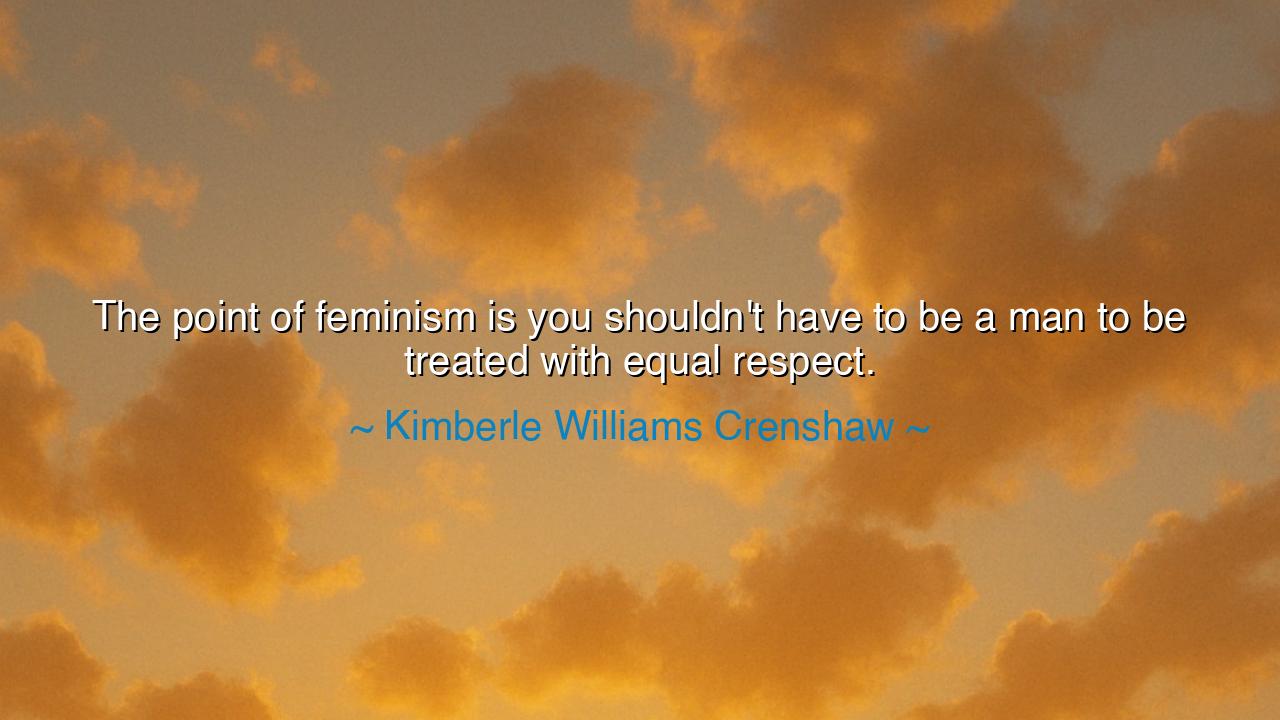
The point of feminism is you shouldn't have to be a man to be
The point of feminism is you shouldn't have to be a man to be treated with equal respect.






Hear, O children of justice, the voice of Kimberlé Williams Crenshaw, scholar of law and champion of equity, who declared: “The point of feminism is you shouldn’t have to be a man to be treated with equal respect.” In this utterance lies a truth carved from centuries of struggle: that dignity is not a prize reserved for one sex, nor a privilege bestowed by those in power, but a birthright of every human being. Respect is not to be weighed by the measure of masculinity, but granted by the measure of humanity itself.
The origin of this saying flows from the heart of feminism, that long river of resistance against a world where women were treated as lesser, their voices muted, their labor unseen, their dreams denied. Crenshaw, who gave the world the concept of intersectionality, reminded us that the fight for equality is not only about women as a whole, but about all women, in their diversity of race, class, and identity. Her words strip away illusions: the point of feminism is simple, yet profound—that one should not need to mimic the ways of men, nor conform to their molds, in order to be worthy of respect.
History offers us countless examples of this struggle. Consider Joan of Arc, the maiden of Orleans, who led armies with courage greater than kings. Though she fought with valor, she was judged not only by her enemies but by her own countrymen, condemned in part for defying the roles laid upon her sex. Her heroism was not denied, but her humanity was questioned. Crenshaw’s words strike against such injustice: that a woman must not become a man in armor to command respect, but should be honored as she is.
Look, too, to the suffragists of the nineteenth and twentieth centuries, who stood in streets, endured prison, and bore ridicule for the simple claim that women were not lesser minds but equal citizens. Many argued then that women must “prove” themselves capable in the same way as men, as though worthiness were measured only in masculine terms. Yet the suffragists stood firm, declaring that equality does not mean sameness, and that respect must not be conditioned upon imitation.
The heart of Crenshaw’s wisdom is this: respect must not be earned by abandoning one’s identity. To demand that women act, think, or live as men in order to gain dignity is to perpetuate the very inequality feminism resists. True equality means honoring the distinctiveness of women, and indeed of all people, while granting them equal standing in rights, in voice, and in respect.
O children of tomorrow, take this lesson into your souls. Do not fall into the trap of measuring worth by comparison to one group alone. Honor the feminine, the masculine, and all that lies between and beyond, for all are threads in the great fabric of humanity. Remember that respect, when given only on conditions, is not true respect at all—it is another chain, polished but binding.
Practically, let your actions reflect this truth. If you are in positions of power, do not reward only those who conform to old molds—seek the voices that bring new perspectives. If you are raising children, teach both sons and daughters that respect belongs not to strength alone, nor to gender, but to the dignity of every soul. And if you are walking your own path, do not believe you must forsake who you are to gain honor—stand as yourself, and demand respect as your right.
Thus Crenshaw’s words shine as a beacon: “You shouldn’t have to be a man to be treated with equal respect.” Let this wisdom guide the generations: equality is not found in sameness, but in the honoring of difference. When respect is unchained from gender, humanity itself is lifted higher, and the world draws closer to justice.






AAdministratorAdministrator
Welcome, honored guests. Please leave a comment, we will respond soon